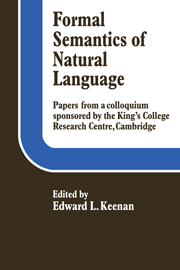Book contents
- Frontmatter
- Contents
- Notes on the contributors
- Acknowledgements
- Introduction
- I QUANTIFICATION IN NATURAL LANGUAGE
- II REFERENCE AND CROSS REFERENCE
- III INTENSIONAL LOGIC AND SYNTACTIC THEORY
- IV QUESTIONING MODEL THEORETIC SEMANTICS
- V PRAGMATICS AND SENTENCES IN CONTEXT
- Pragmatics in natural logic
- Changing the context
- Conditions of the use of sentences and a semantic representation of topic and focus
- Topics, sentence accent, ellipsis: a proposal for their formal treatment
- Preference semantics
- VI SEMANTICS AND SURFACE SYNTAX
Pragmatics in natural logic
Published online by Cambridge University Press: 05 November 2011
- Frontmatter
- Contents
- Notes on the contributors
- Acknowledgements
- Introduction
- I QUANTIFICATION IN NATURAL LANGUAGE
- II REFERENCE AND CROSS REFERENCE
- III INTENSIONAL LOGIC AND SYNTACTIC THEORY
- IV QUESTIONING MODEL THEORETIC SEMANTICS
- V PRAGMATICS AND SENTENCES IN CONTEXT
- Pragmatics in natural logic
- Changing the context
- Conditions of the use of sentences and a semantic representation of topic and focus
- Topics, sentence accent, ellipsis: a proposal for their formal treatment
- Preference semantics
- VI SEMANTICS AND SURFACE SYNTAX
Summary
I would like to discuss two aspects of pragmatics that in recent years have been treated very differently: indexicals and conversational implicatures. Montague and Scott proposed to handle indexicals by adding to points of reference (sometimes called ‘indices’) extra coordinates for speaker, hearer, time and place of utterance. This proposal places indexicals among those phenomena to be dealt with by formal logic, and such systems have in recent years been articulated by Lewis and Kamp, among others. Implicatures on the other hand, were taken by Grice to be by nature informal inferences of a fundamentally different kind than logical inferences, and hence not to be dealt with by the apparatus of formal logic. In other papers I have dropped hints to the effect that indexicals and implicatures should be treated somewhat differently than they are in the Montague-Scott and Grice proposals. I would like to elaborate a bit on those hints.
The basic suggestion is this:
(I) If the goals of what I have called natural logic are adopted, then it should in time be possible to handle indexicals without any extra coordinates for speaker, hearer, and time and place of utterance, and it should also be possible to handle implicatures without any kinds of extralogical inference.
The basic ingredients of the suggestion are as follows:
(A) The so-called performative analysis for imperatives, questions, statements, promises, etc.
(B) The limitation of points of reference to assignment coordinates for variables and atomic predicates. […]
Information
- Type
- Chapter
- Information
- Formal Semantics of Natural Language , pp. 253 - 286Publisher: Cambridge University PressPrint publication year: 1975
Accessibility standard: Unknown
Why this information is here
This section outlines the accessibility features of this content - including support for screen readers, full keyboard navigation and high-contrast display options. This may not be relevant for you.Accessibility Information
- 50
- Cited by
